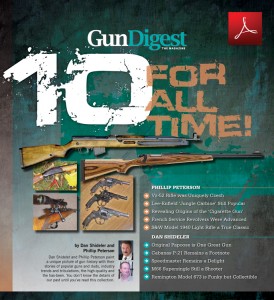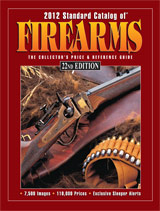
More Gun Collecting Tips
For more gun collecting tips, enter your e-mail in the box below. Right away, you'll get a download featuring 10 of the most collectible guns. You'll also receive gun collecting articles as part of a weekly Gun Digest e-newsletter, as well as e-mails from marketing partners.
[form id=”161011″]

Editor's Note: Click here for instant firearms values and gun prices.
Assigning values to used guns is an inexact science, to be sure, and fraught with uncertainty. The late Dan Shideler, former editor of Standard Catalog of Firearms and expert in firearms history, trends and pricing, had this to say about used gun values, and getting the best price whether you are buying or selling:
When asked what something’s worth, the classic answer is beautiful in its simplicity: “It’s worth whatever someone is willing to pay for it.” That sounds fine, but it falls apart as soon as you consider it. Here’s a real-life example:
A friend of mine was approached at a gun show in Sturgis, Michigan, last year by a man who was offering two guns for sale: One was, as I recall, a plain-jane Remington Nylon 66 – but the other was a Model 76, the only lever-action rifle Remington ever produced. What’s more, the 76 was the Apache Black variant with black stock and chromed metal. The asking price for both guns was $300, or around $150 apiece. After phoning me and getting my opinion, my buddy whipped out his wallet, pulled out three C-notes and walked away with both guns.
Two weeks later, he sold the Model 76 in an online auction for just over $3000. Now I ask you: what was that Model 76 worth? If we assume the saying is true that a thing is worth “whatever someone will pay for it,” that gun was worth $150 at the Michigan gun show – but two weeks later it was worth $3000, even though it was exactly the same gun in exactly the same condition.
How can this be? Simple: Worth (or value) is always a function of time, place, and circumstance.
I can guaran-damn-tee that if my buddy had put that Model 76 in a local gun shop’s consignment rack with a $3000 tag on it, it would still be sitting there. It probably wouldn’t have sold at $1500. Why? Because those would have been an entirely different set of circumstances. In the online auction, the potential customer base is virtually unlimited, whereas selling it in a bricks-and-mortar gun shop is limited to the amount of foot traffic, and northern Indiana isn’t exactly a hotbed of Remington nylon collecting.
The moral? If you see a value of X given for a particular gun in [Standard Catalog of Firearms], don’t assume that you can always realize that figure if you sell one. You may get more, you may get less. And, concurrently, don’t assume you can buy a given gun for the figure cited in this book. You may have to pay more, or you may be able to get it for less.
Here’s another example of how circumstance affects the price of a gun: Last year I listed an absolutely pristine 1982 Winchester Model 94 Crazy Horse Commemorative on an online auction site. I was, frankly, hoping to cash in on the Model 94 fever that was so widespread at the time. Now, my rifle was stone mint. The lever had never been cycled, and the gun had never left its styrofoam sleeve. It was literally NIB (new in the box).
After I posted my auction, I was mortified to discover that three days earlier, someone had posted a NIB, unfired Model 94 Crazy Horse Commemorative on that exact same auction site! Aggghhh! I watched as that 94 climbed past $1500 while mine stuck there stubbornly with zero bids at an opening minimum of $900. It finally closed at $1200, which was good enough for me but considerably below the figure at which the competing auction had ended.
Two nearly identical items; same sale venue; two transactions separated only by a few days: 20-25% difference in prices realized. Now I ask you: what is a Winchester Model 94 Crazy Horse Commemorative worth?
Dan also had a couple of tips about getting the best price on a used gun, whether you are buying or selling:
If you want to sell your guns for the highest possible dollar, sell them at a live, gavelled auction. The competitive atmosphere at live auctions tends to drive prices above what would otherwise be realized in a less highly-charged setting. I have seen a 1962 Colt Official Police .38, NIB, go for over $1000 at a gavelled auction in Illinois, just because the bidders’ egos would just not let them quit.
Conversely, if you are set on acquiring guns at the lowest possible cost, be prepared to spend hours combing through the racks at out-of-the-way gun shops, garage sales, estate sales and antique shops. I once picked up a very nice 1859 Sharps rifle for $300 at an antique mall in Centerville, Indiana, and I’ve found Webley RICs and Hamilton No. 7s at other out-in-the-boonies locations for even less. I’m sure many of you have had similar experiences.
Good luck in your search for interesting firearms.
Use promo code INSIDEGDB to get free standard U.S. shipping on 2012 Standard Catalog of Firearms: The Collector's Price and Reference Guide.

 Two weeks later, he sold the Model 76 in an online auction for just over $3000. Now I ask you: what was that Model 76 worth? If we assume the saying is true that a thing is worth “whatever someone will pay for it,” that gun was worth $150 at the Michigan gun show – but two weeks later it was worth $3000, even though it was exactly the same gun in exactly the same condition.
Two weeks later, he sold the Model 76 in an online auction for just over $3000. Now I ask you: what was that Model 76 worth? If we assume the saying is true that a thing is worth “whatever someone will pay for it,” that gun was worth $150 at the Michigan gun show – but two weeks later it was worth $3000, even though it was exactly the same gun in exactly the same condition. After I posted my auction, I was mortified to discover that three days earlier, someone had posted a NIB, unfired Model 94 Crazy Horse Commemorative on that exact same auction site! Aggghhh! I watched as that 94 climbed past $1500 while mine stuck there stubbornly with zero bids at an opening minimum of $900. It finally closed at $1200, which was good enough for me but considerably below the figure at which the competing auction had ended.
After I posted my auction, I was mortified to discover that three days earlier, someone had posted a NIB, unfired Model 94 Crazy Horse Commemorative on that exact same auction site! Aggghhh! I watched as that 94 climbed past $1500 while mine stuck there stubbornly with zero bids at an opening minimum of $900. It finally closed at $1200, which was good enough for me but considerably below the figure at which the competing auction had ended.